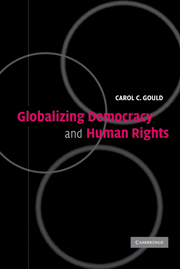Book contents
- Frontmatter
- Contents
- Acknowledgments
- Introduction: Between the Personal and the Global
- PART I THEORETICAL CONSIDERATIONS
- PART II DEMOCRACY AND RIGHTS, PERSONALIZED AND PLURALIZED
- PART III GLOBALIZING DEMOCRACY IN A HUMAN RIGHTS FRAMEWORK
- 7 Evaluating the Claims for Global Democracy
- 8 Are Democracy and Human Rights Compatible in the Context of Globalization?
- 9 The Global Democratic Deficit and Economic Human Rights
- PART IV CURRENT APPLICATIONS
- Index
9 - The Global Democratic Deficit and Economic Human Rights
Published online by Cambridge University Press: 23 November 2009
- Frontmatter
- Contents
- Acknowledgments
- Introduction: Between the Personal and the Global
- PART I THEORETICAL CONSIDERATIONS
- PART II DEMOCRACY AND RIGHTS, PERSONALIZED AND PLURALIZED
- PART III GLOBALIZING DEMOCRACY IN A HUMAN RIGHTS FRAMEWORK
- 7 Evaluating the Claims for Global Democracy
- 8 Are Democracy and Human Rights Compatible in the Context of Globalization?
- 9 The Global Democratic Deficit and Economic Human Rights
- PART IV CURRENT APPLICATIONS
- Index
Summary
We have observed that economic globalization, especially in the form of global capitalism, raises important normative issues; two of its implications in particular have elicited considerable concern on the part of political philosophers. One impact can be characterized as the global justice deficit, that is, the wide discrepancy in wealth, income, and, more generally, development, between diversely situated people or countries. Related to this is the failure to realize the economic human rights – and specifically, the right to means of subsistence – of the large numbers of people worldwide who remain in impoverished conditions. The second normative impact is what has been called the global democratic deficit, in which there is a lack of input and participation, and a correlate lack of accountability, concerning decisions by intergovernmental and other transnational organizations that increasingly affect people's lives, both in developed and in less developed countries. This latter critique has been launched most strikingly against the World Trade Organization and the International Monetary Fund but applies to global corporations and to governments as well.
These two deficits – one of justice and the other of democracy – are clearly related to each other, although each has tended to be discussed separately. One of the aims of this chapter is to highlight some of the conceptual relations between these discourses. But even more important here is to consider some of the remedies that have recently been proposed, especially on the democracy side, for extending accountability on the part of intergovernmental and transnational organizations and, more generally, of increasing the opportunities for crossborder decision making, a topic introduced in Chapter 7.
- Type
- Chapter
- Information
- Globalizing Democracy and Human Rights , pp. 201 - 216Publisher: Cambridge University PressPrint publication year: 2004



